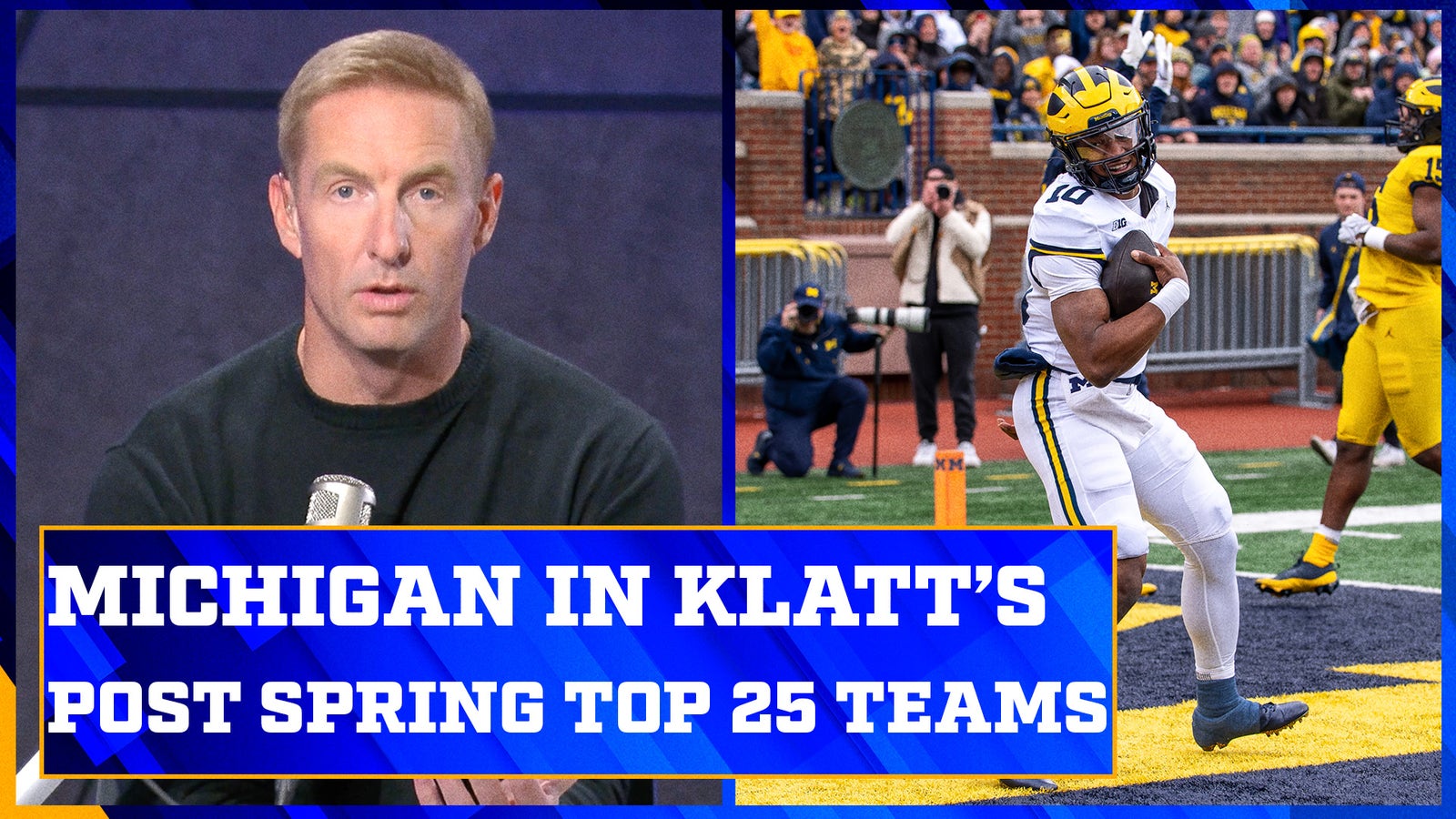Joel Klatt
College Football Analyst
The start of the 2024 college football season is less than 100 days away, which means it’s time for some kickoff dates and times to be announced.
Networks have begun sharing which big games they’ll be carrying in 2024, sharing kickoff times for important matchups. For instance, FOX Sports will carry the Sept. 7 game between Texas and Michigan, the Sept. 14 game between Alabama and Wisconsin and the 120th edition of “The Game” on Nov. 30 with all three games airing in the “Big Noon” window.
While those three games are a few of the biggest of the 2024 season, the process of determining which games will air on which networks isn’t so simple. Earlier in the offseason, FOX, along with NBC and CBS, held a draft to determine which network will get the right to air certain Big Ten games in the 2024 season.
So, I had FOX Sports President of Insights and Analytics Michael Mulvihill on my podcast to discuss the draft process, which he called “the world’s greatest fantasy football draft.” We also discussed the making of the NFL schedule, the birth of the “Big Noon” window and what to expect with Friday night college football games on FOX in 2024.
Here’s a snippet of my conversation with Mulvihill.
Klatt: Can you describe what the draft process is like for networks picking games?
Mulvihill: “The college football schedule is determined literally via draft. In the case of the Big Ten, we (FOX), CBS and NBC go through a draft where FOX holds the top-three picks on the board, and then we have the No. 6 and our next pick is a little later than that. So, it’s not just a straight rotation – one, two, three; one, two, three – the picks change a little bit as we go through that selection order.
“We spent a lot of time thinking about what we were going to do with those top-three picks and what we think would be left for us on the board. We tried to guess what the other networks might prioritize. A couple of guys on my team, Derek Crocker and Ryan Kasoff, do a phenomenal job mocking out how we think the draft might go. They go through dozens of iterations of how the draft might play out. It’s just game theory. It’s thinking, ‘If X happens, what’s our next move? If we do that, how will other people respond to it?’ We spend a lot of time thinking about it because there’s a lot of money at stake and there are huge audiences we are trying to capture.
“I like to say that the college football draft is the world’s greatest fantasy football draft, but it takes $500 million to play. So, it’s a little different than your $50, $100 fantasy football draft with your friends. It’s different in terms of the stakes, but it’s not that different in terms of the mechanics of it. You’re thinking about the best possible allocation of inventory, what are the factors that might go into attracting the biggest audience possible and how do you try to put yourself in a strategic position to not be exposed when the later picks of the draft come around where you don’t have anything high quality for a particular date.”
How the FOX NFL schedule is created and primetime Friday night CFB coming in fall
Klatt: Why did you pick the games for “Big Noon” that you picked this year?
Mulvihill: “In this year’s draft, we hold the top-three selections in the Big Ten, and we will every year for the next several years. That’s a really advantageous position to be in.
“We don’t really earn our salaries by picking Michigan-Ohio State No. 1. Any college football fan would see that’s the obvious first selection. When you start thinking about these next couple of choices, it gets a little more interesting. We felt this year that Texas-Michigan was probably a top-three game on just its own merits. But there’s also a consideration of what else is available on that date. There are days where you might downgrade the top pick a little bit on a specific date because you feel like the second- and third-best games on that date are pretty good. So, it’s not much of an urgent need to get the best available game on that date. In the case of the Texas-Michigan game on Sept. 7, we really felt like if we didn’t get that game, it was a long way down to the No. 2 and an even further way down to the No. 3.
“We wanted to make sure that we wanted to lock in the top choice on a date where there wasn’t a great depth of quality inventory. So, Michigan-Ohio State’s the No. 1, Texas-Michigan is No. 2, and we had a really fascinating conversation about what to do with the third pick, and you were involved in it.”
Klatt: The process of trying to scout the teams, I find fascinating before we even get to the place where you guys are selecting weekends where we have the top pick. So, how did you make the third pick?
Mulvihill: “We probably debated that pick more than any other single pick in the history of college football on FOX. There were two dates we felt were particularly strong: Oct. 12, where Ohio State will go out West and play Oregon. One of the best games of the season, not just in the Big Ten but probably in all of college football.
“The other date that’s really interesting is Nov. 2. There are two ultra-premium games on that day. One is Ohio State going to Penn State, a very traditional, Big Ten matchup. The other is Oregon coming East to play Michigan in the Big House. When you select a date, you select the date and not a specific game. So, if we were to pick Nov. 2, we’d make a selection two weeks out on if we want Ohio State-Penn State or Oregon-Michigan.”
Klatt: Why was the third pick so difficult?
Mulvihill: “A lot of factors came in. One is simply the quality of that Ohio State-Oregon game. Another is the novelty of having a traditional Big Ten power with a West Coast school in the first season of the Big Ten going to West Coast expansion. A third factor is that we’ve built our FOX college football identity around the idea of playing our best games at noon ET/11 a.m. CT and have built that into the most-watched game of the week in college football. We have an enormous pride in it. For us to take the Ohio State-Oregon game, that’s obviously a game we can’t play at noon ET/9 a.m. PT. So, it would trigger a domino effect on that day where we would have to play later in the day and another network would be in our noon window. We would have to put a lesser game in the noon window. There were implications of taking a game that we couldn’t play at noon ET.
Ohio State, Michigan & Utah in Joel Klatt’s post spring top 25

“Other factors that have nothing to do with football, but play into our decision-making is that the Nov. 2 date is three days before the Presidential Election. There will be a lot of political money in our advertising marketplace this year. The idea of being in control of that date, having the option to take Ohio State-Penn State or Oregon-Michigan just a few days before the election and all that campaign money that will come with it, that really resonated with me. In a situation where those two days were close, and you could make an argument for either one, the political element mattered.
“We also think about renewals we have coming with our distributors. You can obviously get FOX via an antenna, but most people get it via bundle, whether it’s cable, satellite or internet-distributed bundles, and we are occasionally faced with the need to renew our deals with those distributors. We want to make sure we want to have the most compelling games when those renewals come up. So, without revealing too much, we do have significant renewals coming up this fall and sometimes the geography of where those companies that we’re dealing with are play into the games we want to select.
“So, there are all of these factors in terms of the strength of the game, the Big Ten expansion, the power of the ‘Big Noon’ brand, what it means to us as a company, the advertising money could be and where the distribution money could be.
“All of these things come into play – and it was the most intensely debated college football draft pick that we’ve ever had.”
Klatt: So, what did you end up doing with the third pick?
Mulvihill: “We traded the pick. We didn’t make the choice. It was so difficult that we just didn’t make it. We can trade our picks in this selection process just like we’d trade picks in the NFL Draft.
“We actually came to a solution that I think worked out well for everybody. I think everyone is going to be satisfied. I won’t name the network we did the deal with because they haven’t announced what they did with the pick, and it’s their news to share. But I can tell you that, in moving down from the No. 3 pick, we then moved up at a later portion in the draft. We ended up with five of the top-seven picks in the draft and we were able to still get that Nov. 2 date.
Klatt: We are the Chicago Bears, is basically what you’re telling me? We traded our pick away, the Carolina Panthers got Bryce Young, and we got all these picks in return to build some more depth in the schedule, to make a blunt and bad analogy.
Mulvihill: “That’s exactly right. When we look at the draft board, we think about where there is separation in the board.”
Klatt: There’s a difference between great college football and games that they think can carry their prime window, like “Big Noon” on FOX. You’re looking for those games to carry those types of windows and there are some weekends where only one game can only carry the water for those types of things, right?
Mulvihill: “Yeah, and I’m glad you said that the way you did. It’s important to understand that we have to make decisions based on the audience potential of these games. Sometimes, those determinations have nothing to do with the perceived competitiveness of the game or anything to do with a judgment of a fan base. They definitely don’t have anything to do with a perception of the quality or the effort among the kids that are going to compete and play the game. But we do have to acknowledge that there are games that are capable of delivering an audience of 10 million and there are games that are capable of only drawing three or four million. We have to do the analysis to figure out which ones are at that most premium level, and we build our schedule around that.”
For more of my conversation with Mulvihill, head over to Spotify, YouTube or wherever you listen to your podcasts.
Joel Klatt is FOX Sports’ lead college football game analyst and the host of the podcast “The Joel Klatt Show.” Follow him on X/Twitter at @joelklatt and subscribe to the “Joel Klatt Show” on YouTube.

Get more from College Football Follow your favorites to get information about games, news and more
